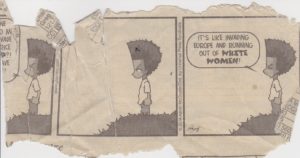 It was a hard line to swallow back in my college years. ‘This isn’t true,’ I thought. I was reading The World According to Garp for a Contemporary Literature course and reacting to this line: “Rape, Garp thought, made men feel guilt by association” (p. 209).
It was a hard line to swallow back in my college years. ‘This isn’t true,’ I thought. I was reading The World According to Garp for a Contemporary Literature course and reacting to this line: “Rape, Garp thought, made men feel guilt by association” (p. 209).
‘Why would I feel guilt about that?’ I said to myself. Rape was anathema, an abomination. Some men out there might do it, but they were not me, and I would most certainly condemn anyone for doing such a thing. To my mind, it was like feeling guilt about someone murdering someone else.
In the eighteen years since that reading, I’m agreeing less and less with my initial reaction. On the one hand, I still agree with my earlier feeling on personal responsibility. You are responsible for the things you choose to do, and the buck stops there. This is a good and important way to think about how the world works: what are you personally doing about an issue, within your ability to do something about it?
As the years passed, it was increasingly impossible not to acknowledge another troubling part of the equation—how men, as a group, can be. Of course I knew about the stereotypes and had even witnessed it, but I tended to avoid situations where such talk happened, and the type of men (or boys) that engaged in such talk. I didn’t care for their behavior. Still, though, I had encountered this attitude when I was with other men—the actions or words that were seen as okay because I was a fellow man. And I had to think about what that meant.
Like the time on the bus in late junior high, when a guy was talking loudly about how he would ask a well-endowed female student what her shirt said, so he could get an easy look. He was technically talking to the guys circled close to him (I was a few rows up and not a part of the conversation), but we were all on a sports team and there were no girls on the bus. I heard more than a few knowing laughs in response. For my part, I felt ill. I understood why the guy would want to look, but also felt terrible for the girl. It was like we were all leering at her collectively.
Or the time in high school when I was walking next to another guy I hardly even knew. We were part of a group headed to a concert, and directly in front of us were two of the girls in our group, one of which he was kind of sort of starting a dating relationship with (one of those hard to follow high school relationships). For reasons still unfathomable to me, he gave a nod at the girl he was dating, waggled his eyebrows at me, and mimed grabbing her rear end.
I was horrified and startled, and this clearly showed in my raised eyebrows and facial expression, since he quickly started talking about something else. Much of my time at the concert that night was spent wondering how to tell the girl what this guy was really like. I kind of knew her, since we were in the church youth group together, but I didn’t know her that well. I settled on telling a friend of hers that I was much closer to so she could pass it on, but I’m still not sure if that was the best thing to do or if it even did any good (I didn’t see much of this guy or the girl he was kind of sort of dating after that point).
I’ve heard far too many stories that are similar, and many that are much, much worse. About eight years ago, I was reduced to a pulse-pounding rage when I read a blog talking about the things often suggested by male college students to women in their classes (either verbally or via text). It would have ticked me off regardless, but I’m a college teacher: no student should have to put up with sexually harassing comments from anyone. I often think of my students as my kids, my family, and if there is one thing you do not want to do around me, it’s mess with my family.
Given these, the stories we’ve all been hearing since the Harvey Weinstein revelations confirm what I already knew—we’ve all been sitting on this iceberg. Men in groups and men alone can feel entitled to say and do things that reduce women to objects, making it easier to harass or rape them.
I think men can be better than this and I know so many men that are better, but it doesn’t change that I am part of a group that has this tendency. When I’m walking alone in a parking lot at night, any woman I meet doesn’t know my background or feelings about all this, they can just tell I’m male, and therefore, a part of that group with that inclination. I hope I don’t cause fear like that, but I am forced to accept that it is a possibility. That guy I hardly knew in high school only needed to know that I was male to think I would agree with his actions.
That’s really what that John Irving quote (which is a similar realization for Garp) is all about—that if you are a man, you are a part of this group that has demonstrated this leaning, time and again. It’s a call to self-awareness and knowing what you are, warts and all. This kind of thinking is not a comfortable one for anyone, as is made far too clear by the many men pushing back wholesale against the #metoo movement, or tweeting utterly baffling things like “Can I even smile at a woman anymore?”
Of course you can smile at women if you’re a man. The issue is when you start expecting more than that—when the woman crossing your path in the dark parking lot should have reason to fear. When the woman sitting next to you in class has to wonder if you’re going to talk to her about the homework assignment or make a suggestion about how she can sexually gratify you. When your co-worker has to wonder if you appreciate what she brings as an employee to the workplace, or if you’re wondering if you could get a little something more from her, be that a date or just someone to take care of the office party because “that’s what women are good at.”
The crux of all this is knowing what expectations you are putting on yourself and others. If you’ve never examined those and their repercussions, you’re probably in for some discomfort (you probably are even if you have put some time examining those… I know I can still feel it). The danger of not asking these questions is losing out on your potential, at being mastered by the expectations you never stopped to consider.
 Mastery. It’s the focus of a book I just finished, and very much relevant here. In Ursula K, Le Guin’s A Wizard of Earthsea, the main character is a man as powerful as many men want to be. Magic comes to him easily, and he learns far more quickly than his fellows. Yet the central thing this mighty protagonist must face is not some external power (a dragon, another wizard, etc.), but his own shadow, his own darkness. A thing of his own creation that threatens to subsume him.
Mastery. It’s the focus of a book I just finished, and very much relevant here. In Ursula K, Le Guin’s A Wizard of Earthsea, the main character is a man as powerful as many men want to be. Magic comes to him easily, and he learns far more quickly than his fellows. Yet the central thing this mighty protagonist must face is not some external power (a dragon, another wizard, etc.), but his own shadow, his own darkness. A thing of his own creation that threatens to subsume him.
The wizard perseveres not by winning, but by naming the shadow and acknowledging it as himself. It takes him some time to recover from the encounter, but once he does, he laughs, because at last he is free and healed. As the book notes, he has become, “A man: who, knowing his whole true self, cannot be used or possessed by any power other than himself, and whose life is therefore lived for life’s sake and never in the service of ruin, or pain, or hatred, or the dark” (p. 143).
Now that is something worth being. That is something worth striving for. It’s not a path easy to begin or continue, but it’s the one worth pursuing—for all of us.


 It was a hard line to swallow back in my college years. ‘This isn’t true,’ I thought. I was reading The World According to Garp for a Contemporary Literature course and reacting to this line: “Rape, Garp thought, made men feel guilt by association” (p. 209).
It was a hard line to swallow back in my college years. ‘This isn’t true,’ I thought. I was reading The World According to Garp for a Contemporary Literature course and reacting to this line: “Rape, Garp thought, made men feel guilt by association” (p. 209). Mastery. It’s the focus of a book I just finished, and very much relevant here. In Ursula K, Le Guin’s A Wizard of Earthsea, the main character is a man as powerful as many men want to be. Magic comes to him easily, and he learns far more quickly than his fellows. Yet the central thing this mighty protagonist must face is not some external power (a dragon, another wizard, etc.), but his own shadow, his own darkness. A thing of his own creation that threatens to subsume him.
Mastery. It’s the focus of a book I just finished, and very much relevant here. In Ursula K, Le Guin’s A Wizard of Earthsea, the main character is a man as powerful as many men want to be. Magic comes to him easily, and he learns far more quickly than his fellows. Yet the central thing this mighty protagonist must face is not some external power (a dragon, another wizard, etc.), but his own shadow, his own darkness. A thing of his own creation that threatens to subsume him.

